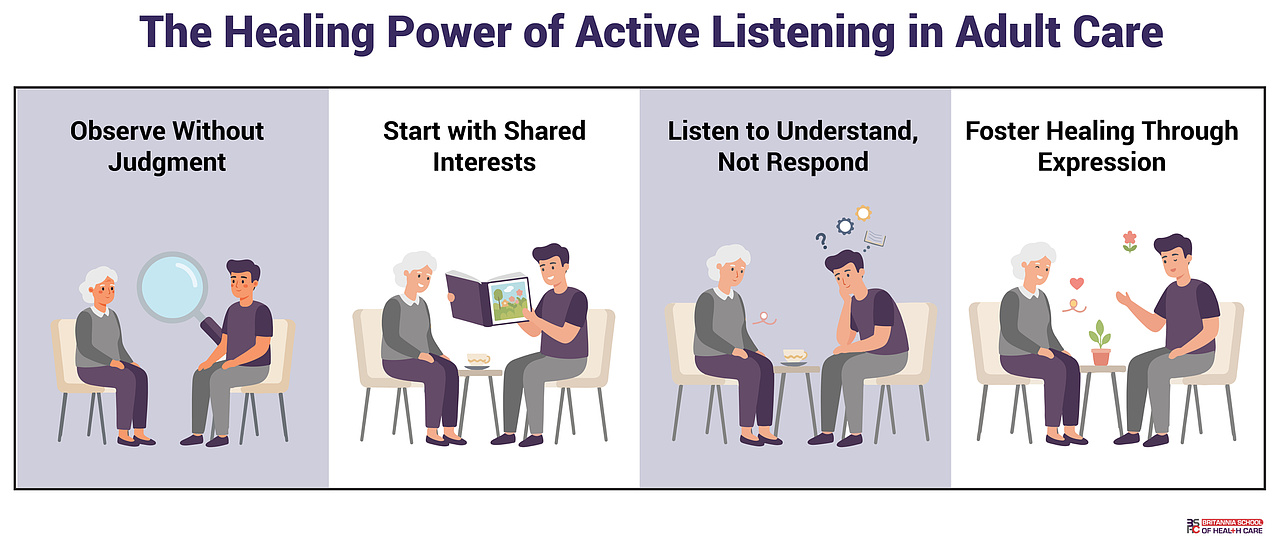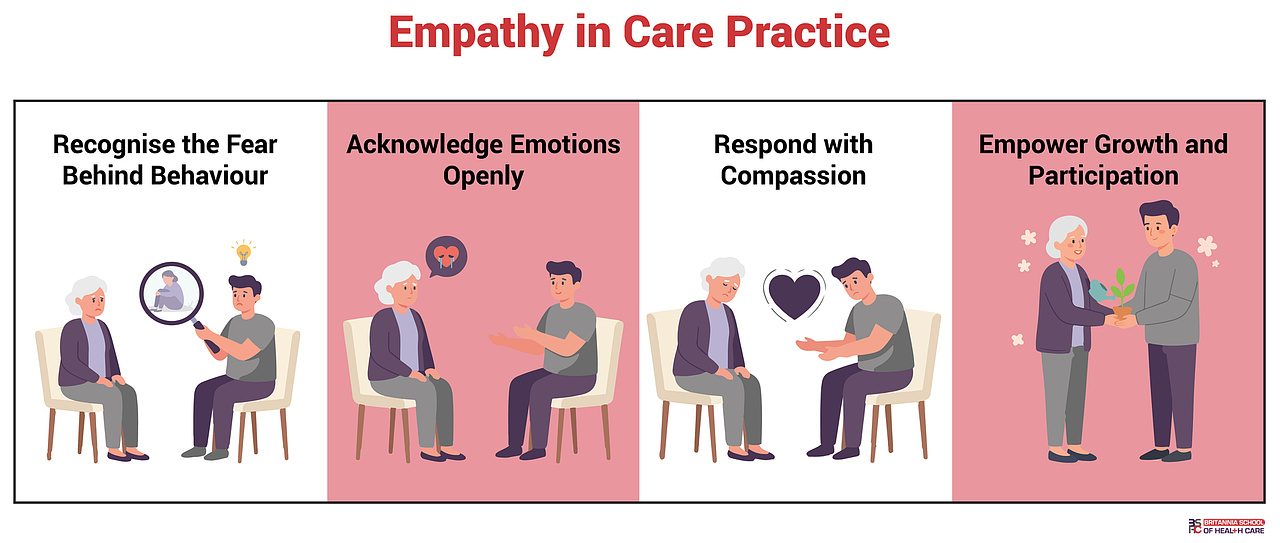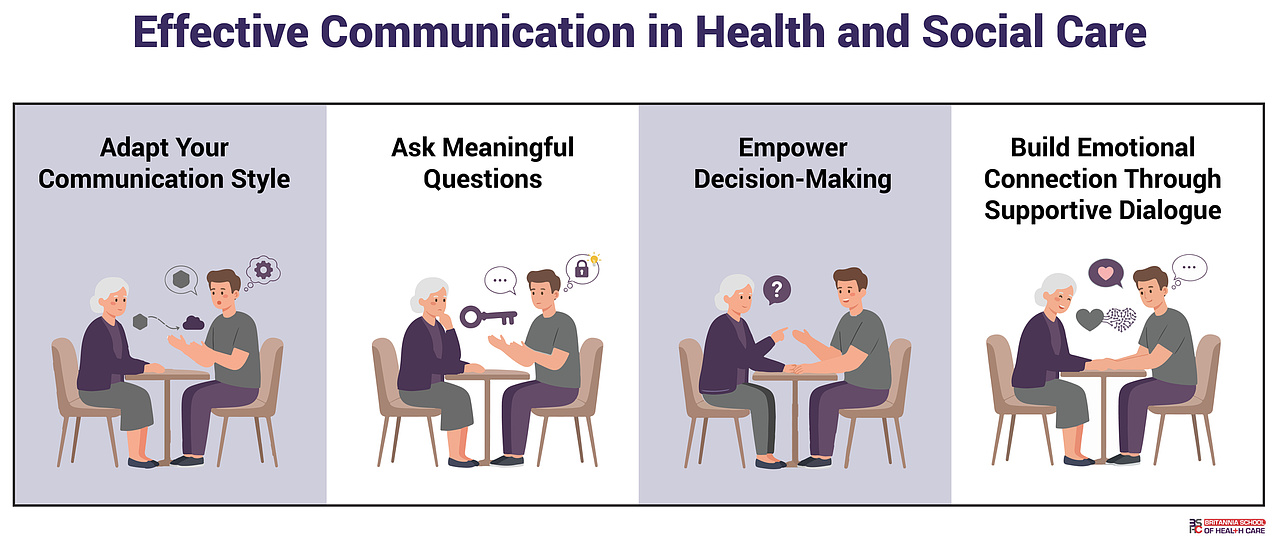Counselling skills play an important role in adult care because they have a significant impact on people who are dealing with a variety of issues and life changes. Counselling skills are used by professionals who work in residential homes, healthcare institutions, and social services agencies to help people communicate openly, establish trust, and offer emotional assistance.
In an adult care setting, the role of counselling skills is to treat each person as an individual, without passing judgement. Counselling in adult care goes beyond a standard therapy room; rather, it uses a person-centred approach to empower clients, treat them with empathy, and respond with understanding.
This blog will take you on a healing journey through the experiences of Evelyn and Anna as they function in an adult care setting using counselling skills.
Understanding Counselling Skills in the Context of Adult Care
The relocation of Evelyn to Rosewood Care Home, which is a significant life transition, posed a significant threat to her mental health and survival in this care facility. She didn’t only move out of her house but also the memories that she made throughout her life. At the age of 62, she had almost 30 years in the same charming cottage that she had shared with her late husband, enjoying her garden, her books, and the peacefulness of the days she knew well.
These kinds of scenarios are common in adult care settings, and one of the biggest challenges for the personnel working there is making the newly relocated person feel comfortable. In this case, counselling skills come into play in order to establish meaningful connections in a less judgemental and more empathetic manner.
What Is the Most Important Aspect of Counselling in Adult Care?
At its core, the most vital element of counselling is not advice-giving or looking for quick solutions. It is listening with real empathy and understanding. Anna, who has been assigned as Evelyn’s care worker, employed core elements of counselling to help her understand her difficulties and make decisions.
Following are the three core elements of effective counselling:
- Active listening – being aware and attentive to the fullest extent.
- Empathy – understanding and accepting the person’s emotional state without criticism.
- Trust – enabling a safe atmosphere where people find it easy to share their thoughts and feelings.
What Happens When Listening Becomes Healing?
In the first week, Anna saw that Evelyn was frequently going to the window during group activities, looking out the window, but not talking. Instead of guessing, Anna chose to use the skill of active listening by being fully present and showing compassion.
As an icebreaker, Anna brought up the subject of the garden to let Evelyn get to know her. After a while, Evelyn’s eyes seemed to be full of life, and she proudly started sharing stories about her apple tree and roses, including how she cared for them in the morning. Anna continued to listen without interrupting, employing the active listening technique.
Here, it depicts how Evelyn’s healing path begins with active listening, which involves understanding and focussing on the person speaking. The most important feature of this strategy is the ability to achieve a balance between talking and listening and to recognise when each action is required.

How Does Empathy Transform Everyday Care?
Moving forward, during the next few days, Anna observed the fear as the main reason of Evelyn resistance to participation in group activities. It was the fear of losing one’s independence and that of being forgotten.
Anna used empathy to lead her through her problems, allowing her to find her way to a better circumstance. Step by step, Evelyn also decided to participate and her enthusiasm for communal activities grew.
Studies consistently indicate that the implementation of empathy by the care professionals leads to lower emotional distress, trust building, and better general health of the cared-for persons. Empathy was what connected Evelyn to the community instead of being isolated.

How Can Communication Build Confidence and Trust?
Throughout the entire Evelyn’s journey, Anna modified her communication manner in order to suit the requirements of Evelyn. Anna asked appropriate questions, and her nonjudgmental approach allowed Evelyn to reflect on her position, discover areas for improvement, and feel empowered to take action. Anna provided a safe environment for Evelyn by encouraging her to open up, express her worries, and make her own decisions.
This allowed Evelyn to feel that she was the one who had control over the situation which is very important when a person loses his/her independence and has to be cared for. In adult care, individuals experience the feelings of loss, fear, or loneliness. What they need most is not a problem-solver but someone who will really listen to them, support their experiences, and assist them in understanding their feelings better.

Counselling Skills in Adult Care: Restoring Meaning, Dignity, and Emotional Wellbeing
Our lives are continuous and constantly changing. We may lack the courage to talk about and untangle the issues in our lives because we are too busy with routines and obligations. There are thousands of stories like Evelyn’s. This story teaches us to never give up and to develop the ability to take action and take charge of our lives. Through a counselling relationship, adult care professionals help people who are struggling in their lives get back on their feet and move towards a prosperous future. In adult care, problem-solving is more than just fixing problems; it’s about working together with people to discover solutions that align with their emotions. All things considered, counselling skills play an indisputable role in adult care, helping people live happier, easier lives while maintaining their satisfaction with the services.

